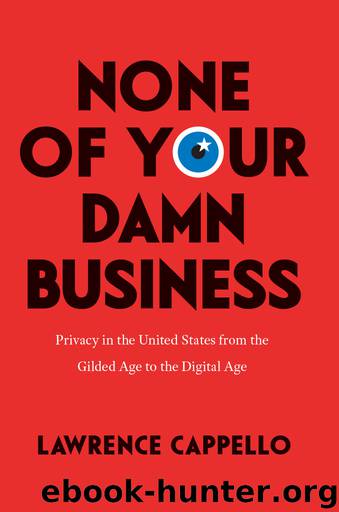None of Your Damn Business by Lawrence Cappello

Author:Lawrence Cappello
Language: eng
Format: epub
Tags: HIS000000 History / General
Publisher: University of Chicago Press
III
One of the funnier stories to come out of America’s first census is the tale of Roger Waite, the calamity-prone census taker from Vermont who was brought to a boil by the unforeseen hardships of his post. His letter of resignation was succinct, but the fellow had a head for imagery: “Sir: I beg to report that I have been dogbit, goose-pecked, cowkicked, briar-scratched, shot at, and called every ‘fowel’ that can be tho’t of. I have worked 12 days and made $2. I have had enough and I beg to resign my position as census taker for Crittenden Township.” In 1790 Waite had to ask only six questions on behalf of the new republic, all of them purely demographic. But despite the absence of any financial inquiry, many perceived the census as an affair linked to taxation, and sporadic pockets of resistance quickly formed throughout the nation. Some went with the silent treatment, some gave false names, others opposed on religious grounds. A census taker in rural Pennsylvania was killed.11
It would be wrong to call the public’s opposition to the first American census a movement. It was more an uncoordinated series of knee-jerk reactions employed in a variety of places for a variety of reasons. The young government, fulfilling its constitutional obligation, successfully collected and processed information regarding almost four million of its citizens. And again, nations have acquired, refined, and made use of data about those they govern since antiquity—usually with some measure of difficulty.
The founding fathers understood that if their experiment with representative democracy was to function correctly, the United States would need some understanding of its numbers. Beyond measuring representation for the states, the government was mostly interested in assessing its potential military and industrial strength. Placing a census requirement in the first article of the nation’s Constitution speaks to their sense of urgency. With Article I, Section II, America became the first country in history to require a regular periodical enumeration of its inhabitants.
Exactly how to do a census fell to the first Congress, which appointed marshals across several districts with instructions to start counting on the first Monday in August 1790.12 The marshals’ assistants, America’s first census takers, asked six questions: name of the head of the household; number of free white males older than sixteen; number of free white males younger than 16; number of free white women; number of other free persons; and number of slaves. They were paid $1 for every 150 persons counted in country districts or every 300 persons in cities and towns. Any marshal failing to file his returns with the government by September 1, 1791, would be severely fined. The final number came in just shy of four million inhabitants.13
Washington and Jefferson both expressed skepticism at that figure, suspecting that many people had “understated to the deputy marshals the number of persons in their families.”14 They had reasons to be suspicious. The original census rosters included such unlikely citizens as Joseph Came, Peter Went, and John Sat, as well those alliterative delights, Comfort Clock and Constance Cathole.
Download
This site does not store any files on its server. We only index and link to content provided by other sites. Please contact the content providers to delete copyright contents if any and email us, we'll remove relevant links or contents immediately.
The Secret History by Donna Tartt(16627)
The Social Justice Warrior Handbook by Lisa De Pasquale(11489)
Thirteen Reasons Why by Jay Asher(7788)
This Is How You Lose Her by Junot Diaz(5774)
Weapons of Math Destruction by Cathy O'Neil(5037)
Zero to One by Peter Thiel(4824)
The Myth of the Strong Leader by Archie Brown(4789)
Promise Me, Dad by Joe Biden(4449)
Beartown by Fredrik Backman(4419)
Stone's Rules by Roger Stone(4416)
How Democracies Die by Steven Levitsky & Daniel Ziblatt(4399)
The Fire Next Time by James Baldwin(4343)
100 Deadly Skills by Clint Emerson(4079)
A Higher Loyalty: Truth, Lies, and Leadership by James Comey(4033)
Rise and Kill First by Ronen Bergman(4012)
The David Icke Guide to the Global Conspiracy (and how to end it) by David Icke(3883)
The Farm by Tom Rob Smith(3872)
Secrecy World by Jake Bernstein(3783)
The Doomsday Machine by Daniel Ellsberg(3731)
